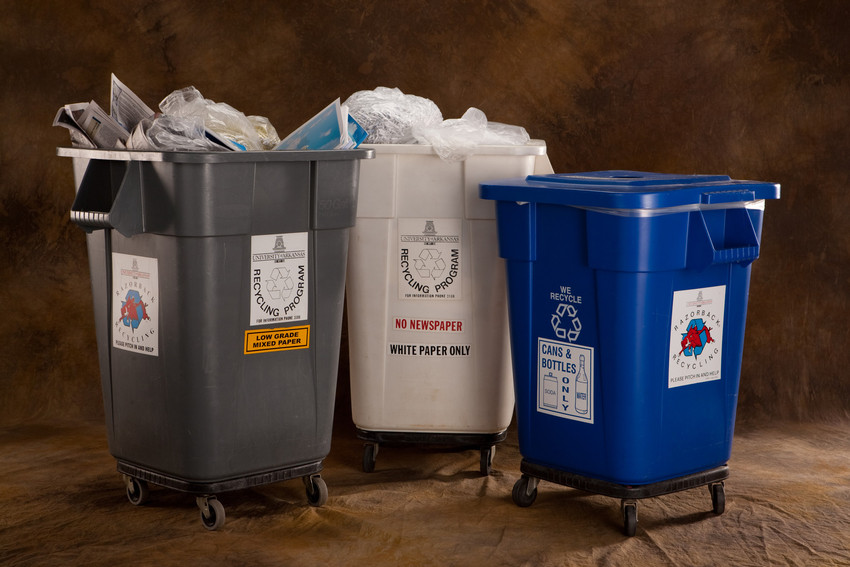Razorback Recycling Expands to Include all Forms of Plastic

All plastics No. 1-7 can now be recycled in the blue bins on campus, along with aluminum and steel cans and glass bottles.
Razorback Recycling, which handles most recycling at the University of Arkansas, is now accepting all forms of plastic, numbers one through seven. Previously, Razorback Recycling could only accept numbers one and two. "This is a success story, you're taking garbage and trash then making them assets," Gary Enzor, Razorback Recycling coordinator, told Arkansas Traveler.¹
This improvement is another step in moving the University of Arkansas towards its goal of reaching 90 percent waste diversion by 2021. This will allow a large reduction of items that would be sent to the landfill, since the only plastic materials that cannot be recycled are contaminated items. However, contamination can be avoided by ensuring that the materials are devoid of leftover food or emptying liquids before placing them in a receptacle.
All recyclable plastic materials can be placed in any recycling bin on campus that is labeled as "cans and bottles" or "plastic bottles". Aluminum and steel cans can also be placed in these bins, which are usually blue. Cardboard and paper will still be collected separately in their respective receptacles.
In 2015, The University of Arkansas diversion rate was close to 27 percent. The expansion of new plastics will certainly have a positive impact on our diversion rate, and will move the needle towards a 90 percent diversion rate by 2021.
In a world where almost every product consumed has some form of plastic packaging, understanding the distinctions between plastics can be difficult. Here is a chart to help connect the various plastics with everyday items:
| Recycling Materials | |||||||
| Plastic Type | No. PET | No. 2 HDPE | No. 3 PVC | No. 4 LDPE | No. 5 PP | No. 6 PS | No. 7 Other |
| Common Uses | 2-liter soda bottles | Detergent bottles | Plastic pipes | Grocery bags | Bottle caps and straws | Plastic tableware | All other forms of plastic not included in 1-6 |
| Single-use water bottles | Milk jugs | Saran wraps | Trash bags | Food containers | To-go containers | ||
In 2010, scientists estimated the total amount of plastic trash dumped in the ocean to be eight million tons. This is equivalent to "lining up five grocery bags of trash on every foot of coastline around the globe." The amount of plastic items put into the ocean continues to increase every year and is expected to increase tenfold in the next decade, according to National Geographic.²
The magnitude of impact that this plastic will have on our oceans is still being researched, however it is clear that is will impact our food supply as the plastic negatively affects the oceanic food chain. The addition of new recyclable plastics at the U of A is a success on this front, as any amount of plastic diverted from entering our oceans and landfills has positive environmental impacts.
- Razorback Recycling to Improve on Campus Zero-Waste Goal, The Arkansas Traveler
- Eight Million Tons of Plastic Dumped in Ocean Every Year, National Geographic
Topics
Contacts
Eric Charles Boles, project/program manager
Sustainability
479-575-2405,
eboles@uark.edu
Headlines
U of A's Inspirational Chorale Makes Its Carnegie Hall Debut
The U of A's Inspirational Chorale took center stage at Carnegie Hall in March, performing under the direction of professor Jeffrey Murdock to a packed audience at the iconic Stern Auditorium.
The State of Economics With Mervin Jebaraj Set for June 5
U of A economist Mervin Jebaraj will analyze state's economic trends and regional issues in an upcoming talk. Preregistration is required by May 31.
Faculty Demonstrate Dedication to Student Success Through Teaching Credentials
Eight faculty members from across the U of A have earned the prestigious Association of College and University Educators certification in Effective College Teaching.
Artificial Intelligence, Machine Learning Boost Arkansas Animal Science Research
Aranyak Goswami, a bioinformatics specialist, will work with three different departments to boost the research arm of the U of A System Division of Agriculture.
College of Education and Health Professions Doctoral Student Picked for Grosvenor Fellowship
Jessica Culver, a doctoral student in the College of Education and Health Professions Adult and Lifelong Learning program, has been selected as a member of the 2024 Grosvenor Teacher Fellowship.




